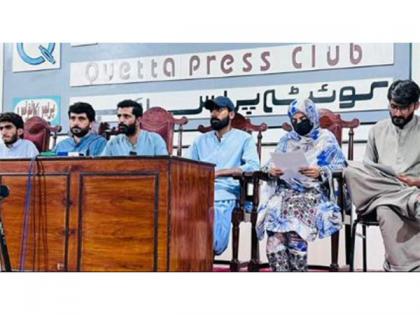BSAC exposes alarming education crisis in Balochistan: Over 70% of schools non-functional, literacy below 40%
By ANI | Updated: July 23, 2025 16:19 IST2025-07-23T16:12:29+5:302025-07-23T16:19:30+5:30
Balochistan [Pakistan], July 23 : The Baloch Students Action Committee (BSAC) conducted a press briefing in Quetta to draw ...

BSAC exposes alarming education crisis in Balochistan: Over 70% of schools non-functional, literacy below 40%
Balochistan [Pakistan], July 23 : The Baloch Students Action Committee (BSAC) conducted a press briefing in Quetta to draw attention to the critical education crisis in Balochistan, citing concerning statistics gathered over the past four years through its Baloch Literacy Campaign, as reported by The Balochistan Post (TBP).
BSAC representatives stated that over 70 per cent of schools throughout Balochistan are entirely non-operational, with literacy rates falling below 40 per cent. The information was shared during an informative briefing event held at the Quetta Press Club.
BSAC leaders pointed out that Balochistan has encountered various hurdles for the last seventy years, including political, social, and economic challenges, despite its wealth of natural resources. They emphasised that while official accounts often depict a positive narrative of development, the actual situation remains bleak. According to them, in the remote regions of Balochistan, basic survival is a daily challenge, TBP reported.
The Baloch Literacy Campaign was first introduced during BSAC's second council session to promote educational awareness among the Baloch community. However, during their visits to various locales in Balochistan, BSAC members discovered conditions were far worse than anticipated. "The idea that Baloch people do not value education due to tribal customs is outdated," said BSAC leaders.
"When our members travelled to advocate for education, they found that many areas have scarcely any functioning schools. Many schools are merely ghosts of structures," as quoted by TBP.
The BSAC indicated that this predicament compelled them to compile thorough data regarding schools in Balochistan, which involved site visits, photographs documenting conditions, and gathering community perspectives. This initiative has been in progress for the past four years. Through the campaign, BSAC assessed hundreds of schools in Baloch-majority regions, stretching from Lyari in Karachi to Koh-e-Suleman and from Dera Bugti to Awaran.
The findings indicated that more than 70 per cent of schools in these areas are completely shut down, while the remaining 30 per cent operate only on paper. Of the operational schools, 95 per cent lack essential amenities such as clean drinking water, electricity, boundary walls, restrooms, and textbooks.
BSAC also referred to the recent Pakistan Economic Survey, which reveals that Balochistan's literacy rate has decreased to 42 per cent, with 70 per cent of children out of school. The situation is even more dire for girls: eight out of 10 girls are unable to attend school.
During the briefing, BSAC showcased evidence of over 250 non-operational schools through videos, photographs, and documents displayed at the conference venue. They also provided a comprehensive report on the literacy campaign, detailing its aims, methodologies, and outcomes.
BSAC leaders asserted that improving the education system is unattainable without fully operational primary, middle, and secondary schools. They condemned the government for constantly claiming to allocate billions of rupees for education in the yearly fiscal budget while the true state of education shows continuous deterioration, as emphasised by the TBP report.
Disclaimer: This post has been auto-published from an agency feed without any modifications to the text and has not been reviewed by an editor
Open in app